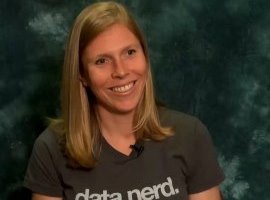InfoQ Homepage QCon New York 2014 Content on InfoQ
-
Azat Mardan on NodeJS and Express
Azat Mardan, popular blogger and author on NodeJS, discusses some of the benefits of choosing NodeJS as a platform. He talks about why startups should consider NodeJS and Express as a platform over other popular options like PHP. He also talks about why more and more enterprises are choosing NodeJS as a platform and some of the benefits as well as the challenges that they may face.

-
Jessica Kerr on Java vs. Scala, Property Based Testing, and Diversity in IT
Jessica Kerr discusses the differences between coding in Java, Scala and Clojure, the charm of autogenerated test data, and diversity in the IT industry.

-
Interview with Erin Schnabel on the Liberty Profile
Erin Schnabel, developer lead of the WebSphere Liberty Profile, spoke to Alex Blewitt at QCon New York about the modular architecture behind the Liberty Profile, and what benefits this has brought both to end users and the developer team. She also highlighted how the the transition from monolithic to modular started with the configuration and broke down dependencies between services.

-
Aish Fenton on Machine Learning at Netflix
Aish Fenton explains how machine learning is used at Netflix for recommendations but also for many more applications.

-
Dianne Marsh on Engineering Velocity at Netflix
Dianne Marsh explains Netflix' approach to managing development teams, how to avoid over-managing them, fostering responsibility and engineering velocity.

-
Nico Bevacqua on Writing Modular JavaScript
In this interview, Nicolas Bevacqua talks about how he initially got into programming professionally as a DotNet developer and how he eventually made the transition to focusing primarily on Node.js development. He discusses his passion for writing open source projects for the JavaScript developer community and some of the projects that he is most passionate about.

-
Roy Rapoport on Canary Analysis at Netflix
Roy Rapoport explains the concept of canary analysis and how Netflix uses it to deploy software to its internal systems.

-
Ashley Puls on the How and Why of Java Bytecode Manipulation
Ashley Puls explains Java bytecode manipulation: reasons for manipulating bytecode, libraries that help, how NewRelic is using it, and more.

-
Tim Ward introduces the OSGi Promises specification
The OSGi Alliance is working on a Promises specification which will provide CompletableFutures that can run all the way back to Java 1.4. Tim explains why this is of benefit and how it compares to Java 8, along with where you can find out more information about the project and how it can be used both inside and outside an OSGi framework.

-
Ines Sombra on Data Services at Engine Yard
Engine Yard's Ines Sombra discusses state management in the cloud in general, and specific data stores including MySQL, Postgres and some NoSQL alternatives. She also explains why the pets and cattle analogy doesn't work for her, and what need to be done in organisations with respect to trusting people and trusting the infrastructure.

-
Craig Motlin Talks to InfoQ about the Origins and Benefits of GS Collections
Craig Motlin, technical lead of the GS Collections project, talks about where GS Collections came from, how it compares with other collections libraries, and what influence it had on Java 8. He describes the different philosophy of GS Collections as compared to other collections libraries, and what benefits open-sourcing the internal library has had

-
Gilad Bracha on How to Make Javascript and the Web a Good Compilation Target
Gilad Bracha explains what Javascript needs to become a good compilation target for a wide variety of languages, live programming, FRP, and much more.
